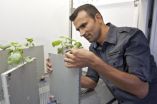(Press-News.org) Small group homes for people with dementia provide good quality care and a domestic environment where people can live as individuals and families can get involved. But tension can arise when it comes to deciding who takes responsibilities for certain practical and caring tasks.
Those are the key findings of a study of two group living care homes in the Netherlands, published in the September issue of the Journal of Clinical Nursing.
"It's estimated that 80 million people worldwide will suffer from dementia by 2040" says Ezra van Zadelhoff from Maastricht University. "Up until now, traditional care for people with dementia has mostly been provided in large nursing homes.
"However, a number of countries are increasingly providing care in small group homes, which offer a more domestic environment focusing on normal daily life. These include group living concepts in the Netherlands, Sweden, Germany and Japan.
"Our study focused on two group living units that had been established for approximately 30 months, each providing care for ten residents with dementia. Both were located in the grounds of a traditional large-scale, non-profit making nursing home in an urban area in southern Netherlands."
The units both centre around a communal living room and kitchen. Eight residents have a private bedroom with their own furniture, 12 share a bedroom with someone else and the units are both decorated to create a homely feel.
All residents require 24-hour care and this is provided by nine nursing staff (7.2 full-time equivalents) aged from 20 to 60 years, with experience in geriatric care. Nursing staff work with the residents to perform household tasks like washing, cleaning and preparing meals in the kitchen and organise activities like walking, exercises and singing.
A multidisciplinary team - nursing home physician, psychologist, physiotherapist and occupational therapist - are involved as required. Both units adhere to a 'home for life' principle, with residents staying there until the end of their lives.
The research team carried out 32 hours of observation over eight days and carried out in-depth interviews with five residents, four family members and four staff.
The key headline findings and observations included:
Residents felt at home and most gathered in the living room during the day to talk, drink coffee or read. Everyday activities provided stability and clarity. People were also able to get involved in familiar activities, like laying the table or washing-up, and this helped them to maintain their identity and feel more at home.
"I can go to my room when I like. But I don't often do so, I prefer to stay in the living room with others."
"I always do the washing here. I always did this at home as well."
Family members were able to get more involved in the group home than they could do in a nursing home. They were treated as members, rather than visitors, had a key and tended to visit more regularly, often helping with personal care and chores. Some family members found this level of involvement more difficult than others and this could lead to tension. But most were happy to visit, get involved in everyday activities at the home and take their relatives to medical appointments, church or the hairdresser, as required.
"It is like being at home. For the visitors this is far more pleasant."
"My mother is at home here. In the traditional unit there were many people who did not know each other. Here she knows everybody."
Nurses built good relationships with the residents and were able to provide individual care tailored to their needs. However, this could make them feel more emotionally attached and compromise their clinical or professional distance. In most cases they were able to work with family members to provide aspects of personal care, but in some cases there were disagreements about who should be responsible for some care.
"As a staff member I feel that there is more engagement compared with regular care. When something is the matter with a resident I feel more involved, more close."
"People get on well with each other, experience the group as a household, we live as a family."
"The findings of our study indicate that the key to providing person-centred care for people with dementia is to enable people to be themselves and live in an environment where they and their families can get involved in normal daily activities" says Ezra van Zadelhoff.
"However the model is not without its problems. Nursing staff get more involved with residents and this can conflict with their clinical and professional distance. And the families in our study varied in how much they wanted to get involved in the care provided by the home, which sometimes led to tension."
###
Notes to Editors
Good care in group home living for people with dementia. Experiences of residents, family and nursing staff. van Zadelhoff et al. Journal of Clinical Nursing. 20, p2490-2500. (September 2011). doi: 10.1111/j.1365-2702.2011.03759.x
The Journal of Clinical Nursing (JCN) is an international, peer reviewed, scientific journal that seeks to promote the development and exchange of knowledge that is directly relevant to all spheres of nursing and midwifery practice. The primary aim is to promote a high standard of clinically related scholarship which supports the practice and discipline of nursing. JCN publishes high quality papers on issues related to clinical nursing, regardless of where care is provided. This includes - but is not limited to - ambulatory care, community care, family care, home, hospital, practice, primary and secondary, and public health. http://wileyonlinelibrary.com/journal/JOCN
Wiley-Blackwell is the international scientific, technical, medical, and scholarly publishing business of John Wiley & Sons, with strengths in every major academic and professional field and partnerships with many of the world's leading societies. Wiley-Blackwell publishes nearly 1,500 peer-reviewed journals and 1,500+ new books annually in print and online, as well as databases, major reference works and laboratory protocols. For more information, please visit www.wileyblackwell.com or our new online platform, Wiley Online Library (wileyonlinelibrary.com), one of the world's most extensive multidisciplinary collections of online resources, covering life, health, social and physical sciences, and humanities.
END
At least one of the "Big Three" credit ratings agencies exaggerated credit scores of private debt compared to public bonds during the last 30 years, according to a new study by researchers from Rice University, American University and Indiana University.
The recent downgrade of U.S. debt by Standard & Poor's makes the study timely, and the research adds to the current debate surrounding regulatory reliance on credit ratings and the current Securities and Exchange Commission proposal to standardize credit ratings across asset classes.
For the study, "Credit Ratings ...
It has long been known that roots alter the soil in their immediate vicinity, where other microorganisms live and the chemical composition is altered compared to that further away from the roots. An international research team has now demonstrated in experiments at the Paul Scherrer Institute that the soil in the vicinity of roots also contains more water – contrary to the earlier belief that there must be less water in this region, as the plant takes up water from the soil. Apparently, however, plants create a small water reserve that helps to tide them over through short ...
Tuesday, September 13, 2011, Cleveland: Researchers at Cleveland Clinic have discovered that cardiac patients receiving medicated stents – a procedure that occurs often when blood vessels are blocked – have a lower likelihood of suffering heart attacks or developing new blockages in the vessel downstream from the stent.
Stents have been used to prevent re-narrowing of coronary arteries after balloon angioplasty and newer designs have included coatings with medications to prevent re-narrowing from occurring within the stent after implantation. The recent study – led by ...
September 2011, Paris, France
The 24th ECNP Congress, which was held from 3 to 7 September 2011 in Paris, France, was once again a great success, bringing together more than 6,700 psychiatrists, neurologists, psychologists and neuroscience researchers from all over the world. ECNP is especially pleased to see an increasing number of delegates coming from outside Europe.
The annual ECNP Congress is the largest scientific meeting on mental and neurological health in Europe, promoting fruitful dialogue between neuroscientists and medical professionals. With more than ...
Scientists reveal in more detail than ever before how white blood cells kill diseased tissue using deadly granules, in research published today in PLoS Biology.
The researchers, from Imperial College London and the University of Oxford, used 'optical' laser tweezers and a super-resolution microscope to see the inner workings of white blood cells at the highest resolution ever. The researchers describe how a white blood cell rearranges its scaffolding of actin proteins on the inside of its membrane, to create a hole through which it delivers deadly enzyme-filled granules ...
Are children as young as five years old so driven by consumerism and fashion that they are in danger of 'losing' their childhood?
Not necessarily, according to Dr Jane Pilcher, a sociologist at the University of Leicester, whose research findings on children and fashion were recently reported in the international journal, Childhood.
Nonetheless, her findings showed that brands and logos are highly important to some children, influenced by family attitudes, peer pressure and celebrity culture.
The desire for certain brands and logos, especially in boys' sportswear, ...
Martha Stokes C.M.T. will be speaking at the AAII Puget Sound Chapter in Mercer Island, WA!
Saturday, September 24, 2011 from 9:00 AM - 12:00 PM.
Registration/Social at 8:30 AM.
The topic will be New Technology Cycle Investing Opportunities.
Attend this meeting and learn:
- Which sectors and industries could experience exponential growth
- Methods for separating the most competitive companies from those that are losing momentum
- The reasons why certain new industries are growing exponentially
For more information please visit:
http://sites.google.com/site/pugetsoundchapter/home
http://technitrader.com/get-connected/
Contact ...
Their critics weren't convinced the first time, but Rice University researchers didn't give up on the "ice that burns."
A paper by a Rice team expands upon previous research to locate and quantify the amount of methane hydrates -- a potentially vast source of energy -- that may be trapped under the seabed by analyzing shallow core samples. The paper published this week by the Journal of Geophysical Research- Solid Earth should silence the skeptics, the researchers said.
Chemical engineers George Hirasaki and Walter Chapman and oceanographer Gerald Dickens headed the ...
Scientists have sequenced the genomes (genetic codes) of 17 strains of common lab mice--an achievement that lays the groundwork for the identification of genes responsible for important traits, including diseases that afflict both mice and humans.
Mice represent the premier genetic model system for studying human diseases. What's more, the 17 strains of mice included in this study are the most common strains used in lab studies of human diseases. By enabling scientists to list all DNA differences between the 17 strains, the new genome sequences will speed the identification ...
Savings at one of the UK's leading theme parks and money off at cinemas can be had from leading voucher codes website DiscountVouchers.co.uk right now thanks to new deals announced this week. The discount voucher codes website, which is home to regularly-updated deals for over 800 suppliers, has introduced new deals redeemable at Chessington World of Adventures and Cineworld.
Great evenings out at the cinema are always popular with kids, and DiscountVouchers.co.uk can help mums and dads treat the kids right now thanks to new Cineworld vouchers on show on the site. Parents ...


